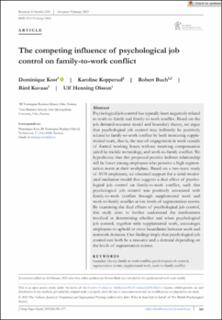| dc.contributor.author | Kost, Dominique | |
| dc.contributor.author | Kopperud, Karoline | |
| dc.contributor.author | Buch, Robert | |
| dc.contributor.author | Kuvaas, Bård | |
| dc.contributor.author | Olsson, Ulf Henning | |
| dc.date.accessioned | 2023-10-20T05:58:47Z | |
| dc.date.available | 2023-10-20T05:58:47Z | |
| dc.date.created | 2023-01-05T08:56:24Z | |
| dc.date.issued | 2023 | |
| dc.identifier.citation | Journal of Occupational and Organizational Psychology. 2023, 96 (2), 351-377. | |
| dc.identifier.issn | 0963-1798 | |
| dc.identifier.uri | https://hdl.handle.net/11250/3097682 | |
| dc.description.abstract | Psychological job control has typically been negatively related to work-to-family and family-to-work conflict. Based on the job demand-resource model and boundary theory, we argue that psychological job control may indirectly be positively related to family-to-work conflict by both increasing supplemental work, that is, the rate of engagement in work outside of formal working hours without receiving compensation aided by mobile technology, and work-to-family conflict. We hypothesize that this proposed positive indirect relationship will be lower among employees who perceive a high segmentation norm at their workplace. Based on a two-wave study of 4518 employees, we obtained support for a serial moderated mediation model that suggests a dual effect of psychological job control on family-to-work conflict, such that psychological job control was positively associated with family-to-work conflict through supplemental work and work-to-family conflict at low levels of segmentation norms. By examining the dual effects of psychological job control, this study aims to further understand the mechanisms involved in determining whether and when psychological job control, together with supplemental work, encourages employees to uphold or cross boundaries between work and nonwork domains. Our findings imply that psychological job control can both be a resource and a demand depending on the levels of segmentation norms. | |
| dc.language.iso | eng | |
| dc.rights | Navngivelse-IkkeKommersiell-IngenBearbeidelser 4.0 Internasjonal | |
| dc.rights.uri | https://creativecommons.org/licenses/by-nc-nd/4.0/deed.no | |
| dc.title | The competing influence of psychological job control on family-to-work conflict | |
| dc.title.alternative | The competing influence of psychological job control on family-to-work conflict | |
| dc.type | Peer reviewed | |
| dc.type | Journal article | |
| dc.description.version | publishedVersion | |
| cristin.ispublished | true | |
| cristin.fulltext | original | |
| cristin.qualitycode | 2 | |
| dc.identifier.doi | https://doi.org/10.1111/joop.12426 | |
| dc.identifier.cristin | 2100994 | |
| dc.source.journal | Journal of Occupational and Organizational Psychology | |
| dc.source.volume | 96 | |
| dc.source.issue | 2 | |
| dc.source.pagenumber | 351-377 | |

